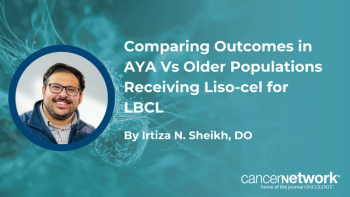
Chemo Confers High Multilineage Myelosuppression Burden in ES-SCLC
Investigators of a retrospective study suggest that reducing myelosuppression may make chemotherapy safer and reduce the need for supportive care among those with extensive-stage small cell lung cancer.
There appears to be a high burden connected with myelosuppression among patients with extensive-stage small cell lung cancer (ES-SCLC) who have been treated chemotherapy in a community oncology setting, according to findings from a retrospective study published in Cancer Medicine.
Overall, 98.6% of patients experienced at least 1 instance of any myelosuppression across all chemotherapy-containing lines of therapies, and 48.6% had decreases across all peripheral blood lineages. Additionally, 33.9% of patients had grade 3 or higher neutropenia, thrombocytopenia, and/or anemia across a minimum of 2 lineages, and 15.5% of patients had grade 3 or higher instances of myelosuppression across all 3 lineages.
At 3, 6, and 12 months of cumulative time on chemotherapy, grade 3 or higher neutropenia occurred in 37.2%, 45.2%, and 57.0% of patients, respectively. The corresponding values were 26.7%, 36.7%, and 45.3% as well as 29.5%, 41.8%, and 49.0% for those experiencing grade 3 or higher anemia and thrombocytopenia, respectively.
In terms of supportive care use, 94.0% of patients received some form of additional therapy, including granulocyte colony-stimulating factor treatment (89.7%), intravenous volume expansion (52.1%), and erythropoiesis-stimulating agents (24.4%). Additionally, 32.6% of patients were eligible to undergo red blood cell transfusions.
“Results from this study suggest an unmet need for managing the burden of multilineage myelosuppression among patients receiving single-lineage supportive care,” the study authors stated. “Mitigating or preventing the myelotoxic effects of chemotherapy has the potential to reduce the burden of myelosuppression among patients with ES-SCLC.”
Investigators of this retrospective cohort study used structured electronic medical record data from the Florida Cancer Specialists & Research Institute between January 2013 and December 2020 to evaluate adult patients receiving chemotherapy for ES-SCLC.
The primary outcome was the incidence of myelosuppressive events across all lines of therapy, which investigators defined as all respective events that took place within 21 days of the first incidence. Additional outcomes included time to myelosuppressive events by type, time to treatment discontinuation and prevalence of and time to next therapy, eligibility for receiving red blood cell or platelet transfusion, and use of supportive care across all lines of therapy.
Patients 18 years and older who received at least 1 line of therapy for ES-SCLC were included in the study. Patients who received frontline therapy as their index line of therapy needed to have evidence of ES-SCLC diagnosis within 180 days of beginning their first study dose of chemotherapy. Having evidence of other primary cancers, missing data on gender or date of birth, and participating in a clinical trial were grounds for exclusion from the analysis.
Among 1239 patients, the mean age was 66.9 years (standard deviation, 9.3), 49.7% were male, and 58.0% were White. Additionally, most patients had an ECOG performance status of 1 (40.4%) and began frontline chemotherapy at index (94.0%). In terms of non-cancer-related comorbidities, patients had chronic pulmonary disease (5.5%), mild liver disease (2.3%), and renal disease (2.2%).
Index treatment regimens most frequently included single-agent platinum- or etoposide-based chemotherapy (64.3%), chemotherapy plus immunotherapy (22.4%), and topotecan-containing chemotherapy (2.3%). With a Kaplan–Meier estimated median time to discontinuation of index line of therapy of 3.6 months (95% CI, 3.5-3.8), a total of 94.6% of patients discontinued index treatment.
Overall, 52.8% of patients received an additional line of subsequent therapy. The estimated median time from initiation of index treatment to beginning the next line of therapy was 6.9 months (95% CI, 6.4-7.5). Patients also received a median of 2 lines of therapy during follow-up.
Reference
Hart L, Ogbonnaya A, Boykin K, et al. Burden of chemotherapy-induced myelosuppression among patients with extensive-stage small cell lung cancer: a retrospective study from community oncology practices. Cancer Med. 2023;12(8):10020-10030. doi:10.1002/cam4.5738
Newsletter
Stay up to date on recent advances in the multidisciplinary approach to cancer.













































